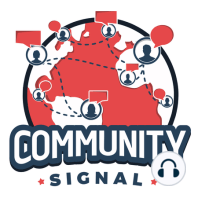45 min listen
Whistleblower: Facebook is Allowing Dictators to Mislead Their Citizens
FromCommunity Signal
ratings:
Length:
39 minutes
Released:
May 31, 2021
Format:
Podcast episode
Description
Last month, Sophie Zhang, a former data scientist at Facebook, went public as a whistleblower drawing attention to how the company delayed action against or outright ignored manipulation of it’s platform by autocratic leaders and global governments to the detriment of the people of those countries. All work, including community management, requires trade-offs, areas of focus, and prioritization. Our teams and resources allow us to increase our areas of focus and more consistently foster the interactions that our communities exist for. But for an organization with the staff and resources of Facebook, you’d expect the trade-offs to be few and far between, and the areas of focus to be vast – covering the areas of the platform prone to abuse just as much as areas that foster healthy interactions. But for Facebook, Sophie describes how, at least internally, those lines between healthy interactions and “inauthentic interactions” surfaced potential conflicts of interest, slowness to take action, and a tendency to focus on some countries more than others. When we’re prioritizing what to work on or how to foster our communities, we may reference company values or internal OKRs. But for community professionals, there’s also the question of how does this preserve the safety of the community and those in it? How is Facebook scaling to protect the political safety of its members? Or perhaps a better question is, does it even think it has the responsibility to do so? As Sophie says, “it’s important to remember that, at the end of the day, Facebook is a company. Its goal is to make money. It’s not focused on saving the world or fixing the product. I think it’s important to be cynically realistic about the matter.” Sophie and Patrick discuss: Manipulation so brazen that the government actors didn’t even bother to hide it The real-world implications that “inauthentic behavior” on Facebook has had for Azerbaijan, Honduras, India, and other countries How Facebook differentiates and actions inauthentic profiles and pages Our Podcast is Made Possible By… If you enjoy our show, please know that it’s only possible with the generous support of our sponsor: Vanilla, a one-stop shop for online community. Big Quotes The unbelievable size of the Azerbaijan government’s fake comment operation (13:33): “I’m going to give you a number that was very shocking. This Azerbaijan [Facebook manipulation] network, it comprised 3% of all comments by [Facebook Pages] on other pages through the entire world. … Azerbaijan is, of course, a tiny country. Somewhere at Facebook, I’m sure there was a team whose [goal] was to make page activity go up, and they were congratulating themselves on the comment numbers.” –@szhang_ds Repetitive content can be totally normal (16:41): “It can be suspicious if everyone is saying the same thing at the same time, but there can also be completely legitimate reasons. … For instance, … Facebook [once] blocked [people saying] ‘Happy Thanksgiving.’ Because, ‘Oh my God, everyone’s saying ‘Happy Thanksgiving,’ there has to be something weird going on.’ … At a company the size of Facebook, most enforcement is automated.” –@szhang_ds Facebook isn’t altruistic in nature (20:15): “It’s important to remember that, at the end of the day, Facebook is a company. Its goal is to make money. It’s not focused on saving the world or fixing the product.” –@szhang_ds Facebook’s actions are driven by outside pressure (21:04): “Most of Facebook’s investigations on coordinated, inauthentic behavior come in response to outside reports. What I mean by that is NGOs doing investigations, news organizations giving reports, opposition groups complaining, etc. When there is an outside figure that’s feeding this to Facebook, that’s someone outside the company who can put pressure on Facebook, who can say, ‘If you’re not going to do anything about this, we’re going to the New York Times and tell them you don’t care about our country. What do you think about th
Released:
May 31, 2021
Format:
Podcast episode
Titles in the series (100)
The Community Manager You Think You Can’t Afford: As community pros, we have more tools than ever to help us do our jobs. That said, the qualities that make an online community and an online community professional successful are likely largely the same today as they were 10, 20, or even 30 years ago. by Community Signal
